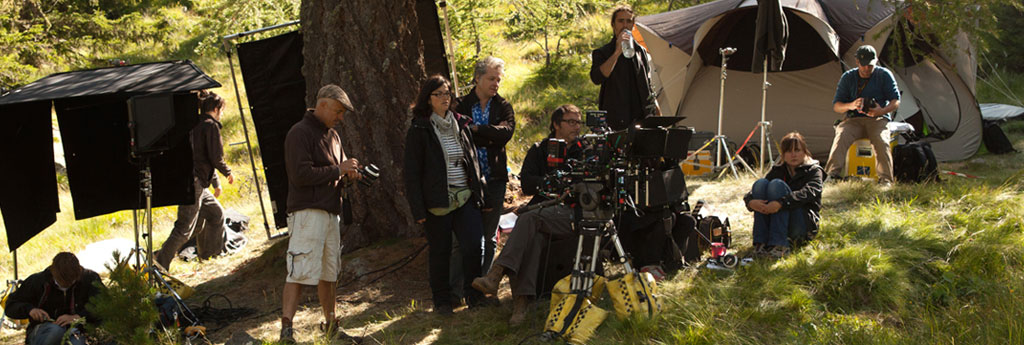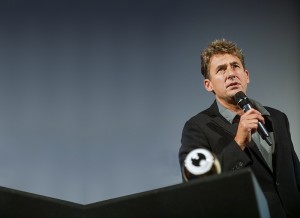
Olivier-René Veillon, Founding Member of Ecoprod and Chief Executive Officer of Ile-de-France Film Commission, on Ecoprod’s activities to green the French Film/ TV production.
What approach is Ecoprod taking to make the Film / TV industry more sustainable?
Ecoprod is imagining a new production process. The idea is not to minimize the carbon footprint of cinema and television productions, but to imagine a new carbon-free production process. First, we make the producers conscious of what they are doing by requiring them calculate their carbon footprint. This resulted from work we did in developing several tools, including Carbon Clap, a carbon calculator. It’s the only way to make producers conscious of their production’s impact on the environment. They are able to calculate the carbon impact in the initial stages of production. Producers sometimes simply think that their productions don’t have any impact on the environment, and this is a problem. Therefore, it’s crucial that they measure the carbon footprint they make.
Which are the biggest obstacles facing Ecoprod?
In Europe, and especially in France, film and television production is highly diversified, which presents difficulties. We have more than 2,000 producers in the Iles-de-France region alone. Ninety percent of French production, as well as a great deal of international production, takes place in Paris and the surrounding regions because of the attractiveness of the city and its surroundings. We have to convince them to be conscientious as well as to respect delicate heritage sites like Versailles, where they frequently want to shoot. We are promoting carbon-free production. That’s the direction we’re taking with cinema and audiovisual production. That’s why we’re involved as a Film Commission. Our concept is local. We’re responsible for this region.
What are the essential steps taken in this process?
First, we’ve been making producers conscious of what they’re doing. At the same time, we’ve been working with all the companies that are involved in the production process. We find carbon-free solutions. We created Ecoprod Charta for all companies involved in the film / television production process. Studios as well as service companies participate by acting sustainably. And to take it a step further, we offer innovative, absolutely carbon-free solutions. We’ve been working closely with the CNC (Centre national du cinéma), which has a fund dedicated to technical innovation in the production process. We are going to present innovations that offer carbon-free solutions at our Conference in Paris on November 25.
How many productions have already used the carbon calculator? And how many companies?
About 200 companies have used or are using the carbon calculator. We enjoy the complete cooperation of the union representing set decorators and line producers. Most of the technicians involved are participating actively. But we’re facing some reluctance from producers, who are focused on the economics of their production. They haven’t yet realized that new production methods may be more economical, if the producer, if course, accepts another vision of production.
What has already been accomplished?
We have substantially reduced the number of generators used on shoots at major locations in Paris. We partnered with the French energy provider ERDF and the City of Paris to equip major locations where productions frequently shoot with power from the electrical grid. In Paris, we have about 80 locations that are used on a permanent basis: the Eiffel Tower; the Arc de Triomphe; and the banks of the Seine. We have equipped these locations electric power so crews don’t have to use generators, which have a strong negative impact on the environment.
Besides energy, transportation is a huge carbon generator. How do you deal with this issue?
Old trucks, which usually have diesel-powered engines, leave a heavy carbon footprint. So, we are offering electricity-based alternatives to help companies find other solutions.
The CNC is doing a lot to support innovative approaches to give the companies the opportunity to outfit their fleets with electric trucks, which is absolutely necessary. TSF and Transpalux are the two major production companies in the Ile-de-France region. They are both signatories to Ecoprod Charta. They realized that they had a great opportunity to provide better service and to introduce a new way of thinking to future productions.
Is it still necessary to raise awareness about environmental issues?
Absolutely, and that’s why we’re going to introduce projects that have benefited from the support of the CNC and which offer operational solutions for production companies at our Audiovisual Conference on November 25. We have the tools. We have the financing. Now, for the companies, it’s simply a matter of strategy and administration. After the presentations on November 25, we’re going to follow up with the Ile-de-France Location Expo in Paris in February. Ecoprod is going to network all the companies that are signatories of Ecoprod Charta with the professionals who are promoting their solutions for film / television production. Everybody who’s anybody in media production is going to be there.
What benefits does sustainable production offer?
The key benefit is the reduction of a production’s carbon footprint. More and more producers, especially American studios, are going to be asking for a production’s carbon footprint, and they’re going to calculate it. Meanwhile, we’re lobbying all the cinema financing programs in France in order to make it a requirement that producers submit not only a production budget but a carbon print of the production, as well, in the application process for subsidies. It has to become standard procedure for producers. This is not the case now because the first step was to give them the tools to be able to address these questions. Now, the carbon calculator exists. It is easy to use. It is free. Anybody can use it. We need to get all our partners on board, the CNC as well as the regions, but especially The Ile-de-France Region, which will be headed by a new president at the beginning of next year. Film subsidies must require a sustainable approach. Now we’re ready to take the next step because we have the tools, we have the solutions, and we have the companies that are able to deliver the services. So, there won’t be any excuses. This isn’t going to cause the producer any trouble, and it’s not going to create any difficulties because calculating the carbon footprint of a production is easy. And it has to be a criterion to evaluate the producer as well as the production. A good producer has to deliver accurate information on the production’s carbon impact and, of course, reduce it.
Is this a question of the political will to go green or is it a question of practical implementation?
I think it’s both. We need to have the practical solutions in order to provide the political will the wherewithal to do everything that’s possible. Of course, the political will is always important, especially in our business, which in France is heavily regulated. We need a strong political will. I think this is the right time, since France hosting the COP21.
What kind of impact does COP21 have?
It’s a fantastic opportunity to accelerate the process. It’s a great honor as well as a great responsibility to host the event. Then this region is going to have to show important sectors like film and television what’s possible to do today, and contrast it with what they are doing today. It’s important to look at the question in this context.













 Robert Redford
Robert Redford Hannes Jaenicke
Hannes Jaenicke Nic Balthazar
Nic Balthazar Nadeshda Brennicke, Actress
Nadeshda Brennicke, Actress Darren Aronofsky, Director, Noah / Jury President, 65th Berlin International Film Festival
Darren Aronofsky, Director, Noah / Jury President, 65th Berlin International Film Festival Tim Bevan
Tim Bevan Thekla Reuten
Thekla Reuten Rachael Joy
Rachael Joy Nikola Rakocevi
Nikola Rakocevi Nadja Schildknecht
Nadja Schildknecht Michael Bully Herbig
Michael Bully Herbig Lars Jessen
Lars Jessen Helen Hunt
Helen Hunt Douglas Trumbull
Douglas Trumbull Dieter Kosslick, Director Berlin International Film Festival
Dieter Kosslick, Director Berlin International Film Festival Benoit Delhomme
Benoit Delhomme Jeremy Irons
Jeremy Irons